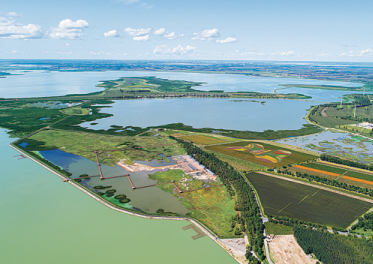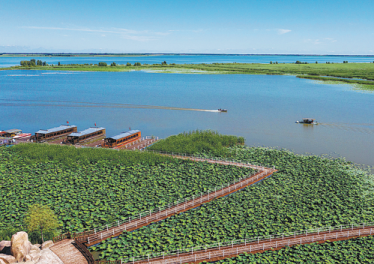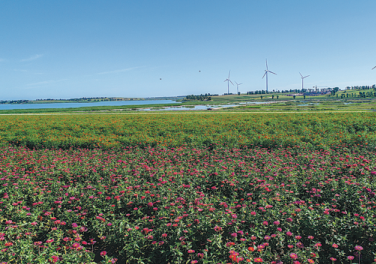Jilin province takes advantage of its liquid assets to stop drought
Water management initiative to divert floods into arid land and help return balance to environment
While the Nenjiang River was flooding, a drought was happening only 2 kilometers away, a water management worker in Northeast China's Jilin province told local media. The floodwaters, so desperately needed elsewhere, were left to waste.
For years floods and droughts had troubled western Jilin, which is flanked by the Nenjiang and Taoer rivers.
Since the 1970s, the region had seen declining precipitation and increasing desertification due to climate change and other factors. More than 2,700 square kilometers of lakes and wetlands had been lost, according to People's Daily.
At the same time, during the annual flood season, more than 30 billion cubic meters of surplus water runs through the region, the Beijing-based newspaper reported.
"A natural solution might be to connect the rivers to the lakes and channel the floodwaters into the lakes and marshlands scattered across deteriorated grasslands and saline and alkali soils," local officials and water management workers proposed, according to Jilin Daily.
In 2013, Jilin launched a water management initiative, dubbed the River-Lake Connection Project, to divert floodwater from rivers into lakes, wetlands and reservoirs in its western areas.
This was the first major water conservancy project by Jilin to restore and improve the local ecosystem.
It is listed as one of the 172 major water projects of the country and an important task in the campaign to revive Northeast China-once the country's industrial heartland, local officials said.
The water project has achieved its goal of connecting rivers with 203 lakes, wetlands and reservoirs in western Jilin. Nearly 2.9 billion cu m of water has been channeled through the network, which has helped restore some 3,700 sq km of lakes and wetlands in nature reserves including Xianghai and Momoge.
The local government said that western Jilin has seen a marked increase in precipitation and a measurable decrease in sandy winds thanks to the project.
Local groundwater has gone up nearly 1 meter on average, which has greatly eased the perennial water shortages in western Jilin.
Almost 4,000 white cranes, or more than 90 percent of the species, stay in the Momoge nature reserve for about 100 days during their migratory flight every year, according to a 2019 report by Chinanews portal.
The rich water resources resulting from the project are also driving the development of local industries. Crop production in western Jilin has grown by 280,000 metric tons thanks to increased irrigation, according to local officials.
The water surface area of fish ponds and crab ponds has increased by more than 560 sq km and over 280 sq km respectively.
The local tourism industry, using resources such as the Xianghai nature reserve, Chagan Lake and Nenjiang Bay National Wetland Park, is also contributing to the rapid growth of the local economy, according to the Jilin government. To improve the water environment of cities and villages on its path, the River-Lake Connection Project has built a number of scenic lakes. Examples include Heming Lake in Baicheng city, Nanhu Lake in Taonan city and Jiuqu Lake in Qianguo county.
Songyuan city in Jilin is building an ecotown, which will "offer dining, lodging, transport, sightseeing, shopping and entertainment services", said Wang Zilian, Party secretary of Songyuan, reported Songyuan Daily.
Baicheng city in Jilin is reaping the rewards of its improved ecology. It has been selected as a pilot city for a national "sponge city "program and has passed inspection for urban water management conducted by the State, according to the Jilin government.

The riparian ecosystem in Chagan Lake is restored through local environmental protection efforts. [Photo/ZHANG NAN FOR CHINA DAILY]

Tourist boats highlight Chagan Lake's charm as an ecotourism resort. [Photo/WANG XUELEI FOR CHINA DAILY]

The wetland of Chagan Lake is home to scores of plants and wildlife. [Photo/WANG XUELEI FOR CHINA DAILY]

An overhead view shows the large number of trees surrounding the ring roads of Meihekou city in Northeast China's Jilin province. [Photo/SUN HONGYU FOR CHINA DAILY]

A family of swans swims in a pond on the campus of Jilin University. [Photo/QU JIAWEI FOR CHINA DAILY]




 Mail
Mail Print
Print Larger
Larger
